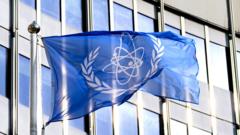The International Atomic Energy Agency's declaration raises tensions, with Iran vowing to build a new enrichment facility amidst complex diplomatic relations.
**IAEA Declares Iran in Breach of Nuclear Obligations for First Time in Two Decades**

**IAEA Declares Iran in Breach of Nuclear Obligations for First Time in Two Decades**
Global nuclear watchdog's board expresses concern over Iran's enriched uranium stockpile and non-cooperation.
The International Atomic Energy Agency (IAEA) has formally declared that Iran is in breach of its nuclear non-proliferation obligations, marking the first such finding in two decades. This decision was propelled by a vote in which nineteen out of the thirty-five member countries of the IAEA's board supported the motion, which garnered backing from pivotal nations including the United States, the United Kingdom, France, and Germany.
The resolution highlighted Iran's many shortcomings in providing the IAEA with comprehensive answers regarding its undeclared nuclear materials and activities, which constitutes a breach of its commitments. The board's statement also raised alarms about Iran's stockpile of enriched uranium that could be utilized for both reactor fuel and potentially as atomic weaponry.
In response to the IAEA's criticism of its lack of cooperation, Iran denounced the resolution as politically motivated and declared intentions to establish a new enrichment facility. Iran’s assurances maintain that its nuclear pursuits are for peaceful purposes only, rejecting claims that it is attempting to develop nuclear weapons.
Under the 2015 nuclear agreement with six world powers, Iran had previously committed to limit its nuclear operations and facilitate extensive monitoring by IAEA inspectors in exchange for relief from severe economic sanctions. However, after the United States withdrew from the agreement in 2018—citing insufficient measures to inhibit the country from developing nuclear weapons—Iran has progressively disregarded the deal's restrictions, particularly those associated with enriched uranium production.
During the IAEA's meeting in Vienna, Russia, China, and Burkina Faso voted against the board's resolution, while eleven countries abstained and two did not cast any votes. The text of the adopted resolution expresses disappointment in Iran's insufficient cooperation as dictated by its Safeguards Agreement, noting that the IAEA cannot confirm the absence of nuclear material diversion.
Consequently, the matter could escalate to the United Nations Security Council, which possesses the authority to reinstate sanctions previously lifted under the 2015 accord should Iran continue to flout its obligations. European powers have indicated that further actions could transpire later this year unless Iran redresses its approach.
A joint statement from France, Germany, the United Kingdom, and the United States called this board action an opening for Iran to comply with its commitments, urging the nation to clearly address longstanding inquiries regarding undeclared nuclear activities. Iranian authorities, however, countered such claims, asserting that the IAEA board's decision was devoid of technical validity.
In an indication of its defiance, Iran announced plans for the establishment of a new uranium enrichment facility situated at a secure location and intends to replace existing centrifuges with advanced models at the underground Fordo site. Iranian Foreign Minister Abbas Araghchi suggested that such resolutions complicate the ongoing negotiations for a new nuclear agreement with the U.S., highlighting a deepening entrenchment in diplomatic standoff.
Amidst the mounting geopolitical tensions, the United States has begun advising the evacuation of non-essential personnel from its embassies in the region, with Israeli defense forces reportedly preparing to take action against Iranian nuclear establishments. Iran has assured that any aggressive strike will elicit a forceful response aimed at U.S. military positions within reach.



















